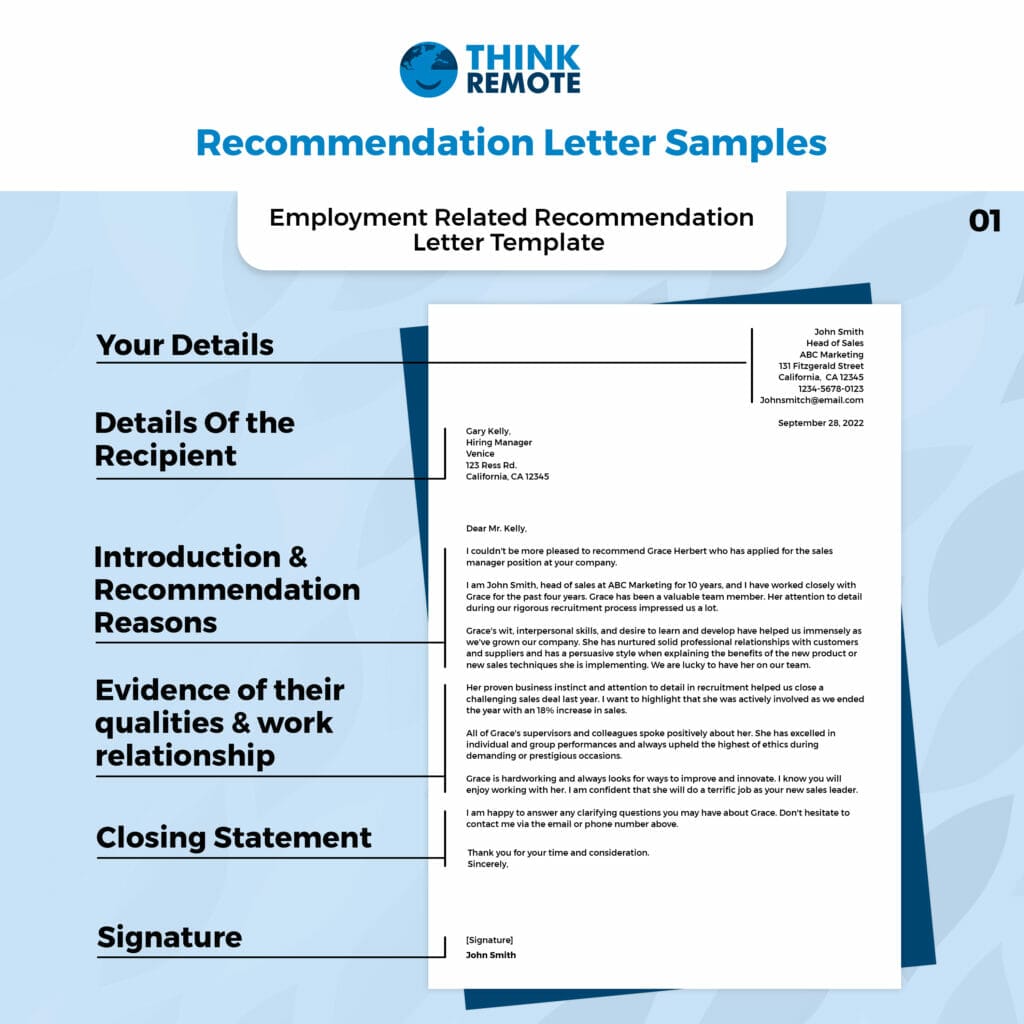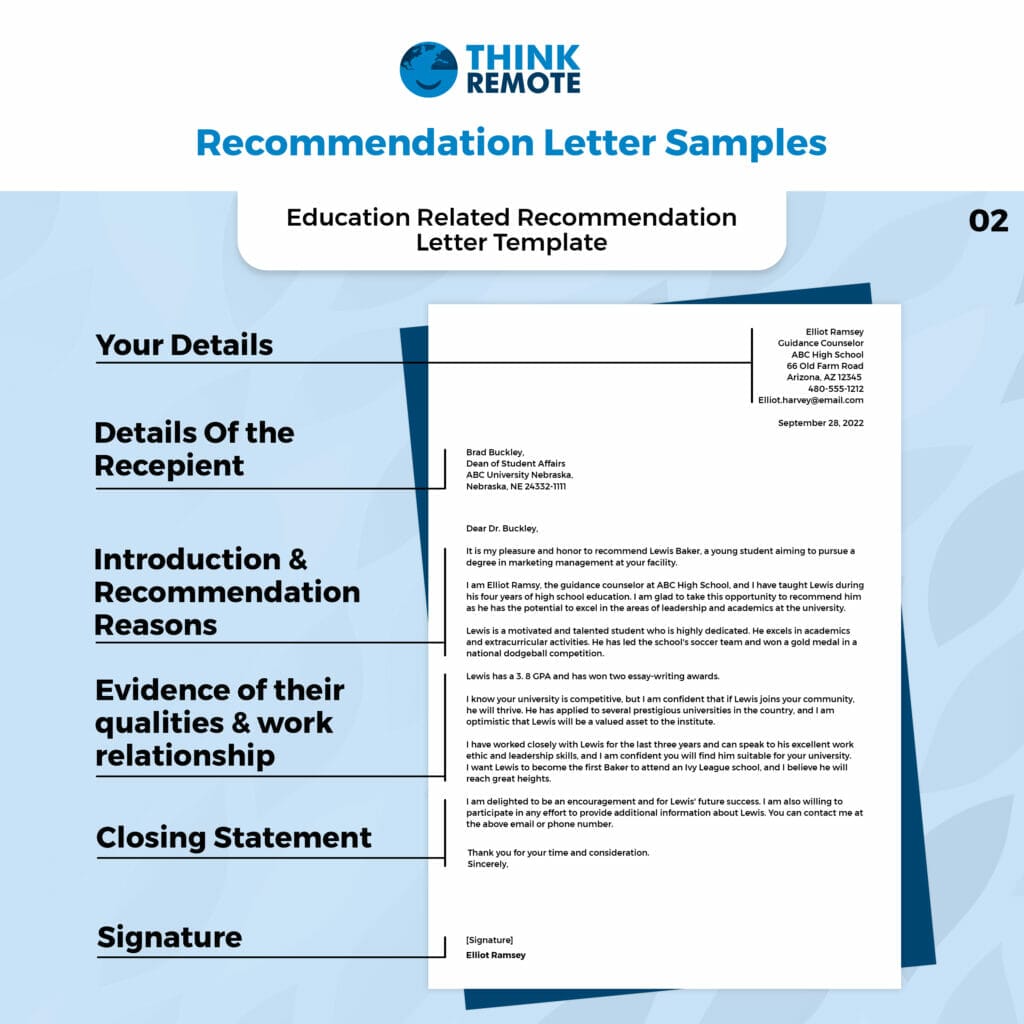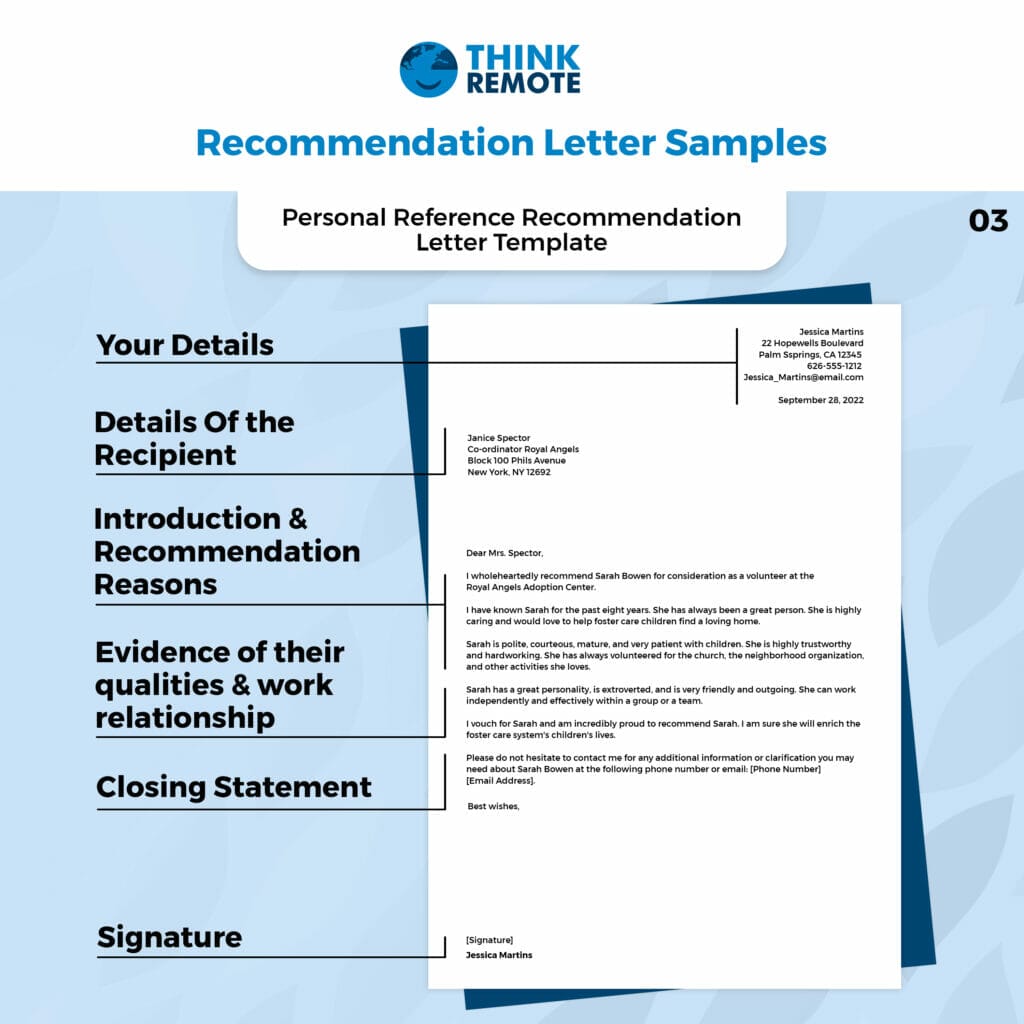Do you need to write a recommendation letter? Or do you want to request one? Either way, we’ve got some tips.
A letter of recommendation tells the reader who a candidate is and what they have to offer. It is a tool that helps others understand a person’s skills and helps them get a job or further their education.
Read on to learn all about writing a letter of recommendation for someone and requesting one for yourself. We also provide three samples that you can use as a guide when writing your own letters.
Let’s dive in!
What is a Recommendation Letter?
A recommendation letter is a document that provides evidence of an individual’s qualifications and character. A well-written letter can be a valuable asset in a job seeker’s toolbox. It can come from various sources, including a teacher, coach, employer, or someone who knows the job seeker well.
The letter should be tailored to the specific job or program the applicant is applying for and provide concrete examples illustrating why the applicant is suited for the position.
Requesting a Recommendation Letter
It should go without saying that the person(s) you choose to write a recommendation letter for you must be people who feel positively about you. You don’t want to take chances by requesting a less-than-enthusiastic recommendation from someone who isn’t in your corner.
The best recommendation would come from someone:
- Who has authority and knowledge about you – If it’s for a position within an organization, the boss, manager, supervisor, or someone in the same department is best.
- Who has the time and inclination to write a letter – The person should be able to provide thoughtful insight about you and why you would be an asset in the position you’re applying for.
Once you have identified these person(s), discuss the job or opportunity with them in detail. Tell them what skills and qualities you want them to highlight in the letter. For instance, if the job application specifies that they need someone with excellent interpersonal skills and strong attention to detail, let the recommender know so they can highlight those traits in the letter.
Also, it is better to let a potential recommender know in advance that you plan to ask them for a letter so they aren’t surprised later on.
Format to Write a Recommendation Letter
Heading and Salutation
The header will include information such as:
- Your Contact Information
- Your Name
- Your Title
- Company or School Name
- Address
- City, State Zip Code
- Date
Depending on the type of reference letter, your salutation will vary. For example, if you are writing a letter of recommendation for a student, you’d need to address the recipient by their position and last name: Dear Professor Marshall, Dear Dean Jones, etc.
If you are writing a letter of recommendation for a hiring manager or someone without a professional title, you will use the more formal “Dear Mr/Mrs/Miss” and their last name. For instance, Dear Mr. Jackson, Dear Miss Saunders, etc.
Pro Tip: Even if you don’t know the recipient’s name, avoid using the phrase; “To Whom it May Concern.” Instead, address them by their title: Dear Professor, Dear Dean, Dear Hiring Manager, etc.
The Body of the Letter
The body of the letter is where you explain why you are a good reference, the applicant’s qualities, how they fit the position, and why they should be hired.
The length of your recommendation letter is often interpreted as a measure of its strength – a strong recommendation should ideally be between 1-2 pages. A recommendation letter with a shorter or scanty body is perceived negatively and may harm the candidate’s chances.
First Paragraph
You need to explain how you know the individual you are writing a recommendation letter for and why you are qualified to do so.
Second Paragraph
In the second paragraph, you will discuss the applicant and explain why they are fit for the position, what they can contribute, and why you recommend them. Although, this should typically be more than one paragraph.
Third Paragraph
The recommendation letter should include details about how the candidate’s skills match the job opening or admission requirements. To tailor your letter accordingly, request a copy of the job posting or program criteria and cite specific examples of how the candidate meets them.
Summary and Closing Salutation
In this section, you should highlight your enthusiasm for the person and provide details of your recommendation.
Briefly describe why you recommend the person in this section of the letter. In your endorsement, use phrases like “highly recommend,” “strongly endorse,” or “I give the candidate my highest recommendation.”
Let your closing salutation reinforce the importance of hiring the individual for the post by ending on a positive note: “Please do not hesitate to contact me if you have any questions.”
Your recommendation letter concludes with an invitation to give more information. Under your signature or in the return address section of your letter, include your phone number and email address.
Tips to Write a Recommendation Letter
1. Give Your Introduction a Punch
When writing a letter of recommendation, your first sentences must give the reader a feeling that you are upbeat and confident to vouch for this person. Your choice of words should reflect your conviction about the candidate in question.
For example, “I am writing with regards to the recommendation for…” is generic and bland compared to “It is with great honor that I recommend…” which sounds confident.
The first introduction doesn’t leave the reader with a lingering impression about the applicant; the latter does. So help the applicant’s chances by starting strong.
2. Highlight the Applicant’s Strengths
A key reason you write a recommendation letter is to make the applicant look good to the recipient by bringing out their positive traits like work ethic, drive to succeed, and passion for the job.
Be specific when you talk about the candidate’s accomplishments. Mention the projects they worked on, the awards they won, and their contributions to the organization. This emphasizes to the reader that you are recommending someone reliable.
If you must mention weaknesses, frame them positively. E.g., demonstrated improvement in time management in a fast-paced environment sounds better than poor time management skills or lack of focus.
3. Avoid Being Vague
To write a professional letter of recommendation, you need to back up claims. Your words need to be precise to accomplish this.
Avoid vague sentences such as; “John was an active member of our sales team.” Instead, say, “John helped us increase our sales by 20% in the first year.” These precise words make it clear to the reader what John did and how he did it.
4. Connect the Candidate’s Skills with the Position
Before you write a letter of recommendation, ask the applicant to give you a copy of the job or admission requirements. The requirements provide insight into what they are looking for in a candidate and will allow you to tailor the letter accordingly.
Use some terms from the job posting to signal to the hiring manager that the candidate possesses the necessary skills. For instance, “Jane has stood in for her team lead several times, so I do not doubt that she is ready to assume the responsibilities of a team lead role at ABC Company.”
5. Edit and Proofread Your Letter
Always proofread your letter carefully to catch any mistakes or inconsistencies in language or logic before sending it to the recipient. Your writing shouldn’t give the reader a reason to reject the applicant.
Recommendation Letter Samples
Employment Related Recommendation Letter Template

Education Related Recommendation Letter Template

Personal Reference Recommendation Letter Template

Final Thoughts
Words can make or mar you – what you say and how you say it. The words on a letter of recommendation carry so much weight. They could be the difference between getting in or not to your dream college/university program/scholarship/job/etc.
So if you write a recommendation letter, make sure to put your heart into it – not just say nice things for the sake of it. Put yourself in the reader’s shoes and ask: Would I want this recommendation or this letter? If not, rework it and make it better. Good luck!






